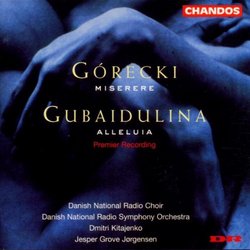| All Artists: Peter Fog, Sofia Gubaidulina, Henryk Gorecki, Dmitri Kitayenko, Jesper Grove Jørgensen, Danish Radio Symphony Orchestra, Karl-Gustav Andersson Title: Górecki: Miserere; Gubaidulina: Alleluja Members Wishing: 1 Total Copies: 1 Label: Chandos Release Date: 6/17/1997 Genre: Classical Styles: Opera & Classical Vocal, Chamber Music, Historical Periods, Classical (c.1770-1830) Number of Discs: 1 SwapaCD Credits: 1 UPC: 095115952320 |
Search - Peter Fog, Sofia Gubaidulina, Henryk Gorecki :: Górecki: Miserere; Gubaidulina: Alleluja
 | Peter Fog, Sofia Gubaidulina, Henryk Gorecki Górecki: Miserere; Gubaidulina: Alleluja Genre: Classical
![header=[] body=[This CD is available to be requested as disc only.]](/images/attributes/disc.png?v=15401716) ![header=[] body=[This CD is unavailable to be requested with the disc and back insert at this time.]](/images/attributes/greyed_disc_back.png?v=15401716) ![header=[] body=[This CD is available to be requested with the disc and front insert.]](/images/attributes/disc_front.png?v=15401716) ![header=[] body=[This CD is unavailable to be requested with the disc, front and back inserts at this time.]](/images/attributes/greyed_disc_front_back.png?v=15401716) |
Larger Image |
CD Details |
CD ReviewsGubaidulina ups the ante by adding choir to the massive orch Christopher Culver | 07/20/2006 (4 out of 5 stars) "This Chandos disc, recorded in 1996, pairs Gorecki's work for unaccompanied choir "Miserere" with Sofia Gubaidulina's massive "Alleluia" for choir, boy soprano, and orchestra. I'm not too big a fan of Gorecki, so I'll limit my comments here to Gubaidulina's work, which is performed by the Copenhagen Boys' Choir and Danish National Radio Symphony and Choir conducted by Dmitri Kitajenko. Gubaidulina wrote "Alleluia" in 1990. The piece continues the theme of initial religious doubt and final victory of faith introduced in "Pro et contra" for large orchestra (1989). In fact, Gubaidulina intended the two to be played together, and wrote the oratio "Lauda" to form a trilogy called "Prayer for the Age of Aquarius". Since "Alleluia" shares so much of its soundworld and pacing with "Pro et contra", if you didn't like the first piece, you probably won't like this one. Though I should implore anyone in doubt about "Pro et contra" to listen to it on a good stereo system first, since its basses, so much a part of the work, don't come out well on lesser equipment. So here the Russian "Hallelujah" hymn, which remained hidden throughout most of "Pro et contra" is here expressed openly by the (adult) choir. But all is not quite yet well, for the singers lack conviction in this statement. The form of the work is the struggle with making a sincere confession of God's glory, and the percussion seems to represent the turmoil of the soul in doubt. After several movements consisting of only the word "Alleluia", the piece climaxes in the sixth movement with a fear-inducing statement of the word "Vjeruju" ("I believe"), and both choir and orchestra collapse in exhaustion. At that point the boy soprano choir humbly intones the hymn "Da ispolnatsja usta maja" ("Let my mouth be filled with thy praise"). Keeping with the tradition established in her work since the early 1980s, the piece heavily uses the Fibonacci sequence in its rhythm. But the Fibonacci sequence and attendant numerical mysticism plays an important role in one part of the work regrettably missing from a compact disc recording: the use of coloured lights. Inspired by Alexander Scriabin's "Promethei", this work uses a colour organ to display various lights whose mixing represents certain theological truths for Gubaidulina. The same effect is a major part of her fourth string quartet. I'm inclined to mope that no live performance seems on its way so that I can see "Alleluia" as it is meant to be, but still this disc is worth hearing for Gubaidulina fans, and the sound quality is by no means as bad as reviews lead me to fear. If you are as yet unfamiliar with this greatest of contemporary religious composers, I think her symphony "Stimmen... Verstummen..." or her violin concerto "Offertorium" (on a fine recent DG reissue) make better introductions, but still, don't wait long to get "Pro et contra" and "Alleluia"." Poor performance Christopher Culver | 05/22/2001 (2 out of 5 stars) "As a big fan of Gubaidulina, I needed to hear this work but the performance is so poor that I doubt if any idea of what this work is like can be gained. The same is true for the Gorecki."
|

 Track Listings (18) - Disc #1
Track Listings (18) - Disc #1